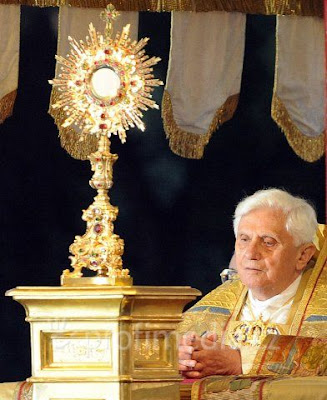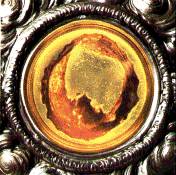
Posted on 06/13/2009 6:54:53 AM PDT by NYer
There is a sign on the sacristy wall of St. Elizabeth Ann Seton Basilica in Emmitsburg, Md., which reads, “Priest of God, celebrate this Mass as if it were your first Mass, your last Mass, your only Mass.” It is a potent reminder to the priest to pay attention to what he is doing. He is not to celebrate the sacred mysteries with a careless or cavalier attitude, but with the proper reverence and disposition. He is not at the altar to entertain or improvise, nor should he rush through the Mass as quickly as possible. He is a priest, empowered by Christ through the sacrament of Holy Orders, to renew the offering of the cross. The sign in the basilica is a powerful little prayer that the priest will not forget that profound truth.
As we celebrate the Solemnity of Corpus Christi — the Solemnity of the Holy Body and Blood of Our Lord — perhaps we can alter that sign a little: “People of God, receive this holy Communion as if it were your first, your last, and your only holy Communion.” How much more we might be engaged if we participated in the Eucharistic sacrifice as if it were the first, last and only opportunity we would have to do so — not simply by singing and reciting the prayers, but uniting ourselves completely with Christ as He renews the offering of Himself on the cross. As we draw near the altar to receive the Blessed Sacrament, we ought to be mindful of what — or better yet, Who — we are receiving and not approach with a thoughtless or casual attitude, but with reverence, respect and humility.
Our Lord tells us in chapter six of John’s Gospel, “My flesh is real food and my blood real drink. He who eats my flesh and drinks my blood abides in me and I in him.” This week’s Gospel recalls the moment when Our Lord instituted the Eucharist and gave us the means by which we should experience true communion with him: “While they were eating, he took the bread, said the blessing, broke it, gave it to them, and said, ‘Take it; this is my body.’ Then he took a cup, gave thanks, and gave it to them, and they all drank from it. He said to them, ‘This is my blood of the covenant, which will be shed for many.’” For these reasons, it has been the constant teaching and understanding of the Church that when Christ’s words are spoken at Mass, bread and wine become His sacred body and blood. Consequently, when we speak of the Eucharist, we dare to speak of the Real Presence. Yes, Christ is truly present in this holy sacrament. Yes, He provides us with real food and real drink, just as He said He would. Yes, He fulfills His promise to be with us until the end of time in a real, concrete way.
To speak of the Real Presence is the only way to make sense of several things Paul says in his first letter to the Corinthians. First, he says, “Whoever eats the bread and dinks the cup of the Lord in an unworthy manner will be guilty of profaning the body and blood of the Lord.” If the Eucharist was ordinary bread and wine, it is doubtful Paul would have used such strong language, telling the Corinthians, and us, that receiving the sacrament unworthily (i.e., in a state of mortal sin) is a sacrilege. Such language could only be used if Christ is truly present; a sin is committed against a person, not a piece of bread.
Next, Paul says, “The cup of blessing which we bless, is it not a participation in the blood of Christ? The bread which we break, is it not a participation in the body of Christ? Because there is one bread, we who are many are one body, for we all partake of the one bread.” If we take the Real Presence seriously, then receiving the Body and Blood of Christ establishes the faithful as one body. The person sitting next to you in church on Sunday may be a stranger, yet he or she is one with you in the Body of Christ. In receiving the Eucharist, we become what we receive: the Body of Christ. This reality should have a tremendous impact on how we treat those around us. Through this holy sacrament, Christ comes to dwell in us. How much more seriously we as Catholics should take Our Lord’s words, “What you did for the least of my brothers, you did for me.”
When I say that we should receive each holy Communion as if it were our first, our last and our only holy Communion, it is for no other reason than to renew our devotion and love for the Blessed Sacrament. If we approach the sacrament in this manner, it will not become commonplace or routine, and we will be prepared to receive the Lord with a reverent and humble disposition.



Would to God all Christians experienced the sanctifying power of the Body and Blood.
Alas, first one must believe they ARE the Body and Blood....
I hope it's just the light. What burdens he has to bear!
This is a bit misleading. The notion of a "moment" of consecration did not exist in the ancient church but was a later development. That is not to say that the ancient church did not believe that the bread and wine become the body and blood of Christ.
Even when the notion of a "moment" did develop, there was never total agreement as to the moment. In the East, the "moment" came to be seen as the invocation of the Holy Spirit, while in the West, it came to be seen as the words of institution. There were some who professed that the "moment" ocurred at the offeratory. So, while it can be stated that the issue has been settled (and settled for quite some time), it can't be said that it was ever thus.
It has, however, been the constant teaching and understanding of the church that what is offerred is bread and wine and what is consumed are are the body and blood of Christ.
Disclaimer: Opinions posted on Free Republic are those of the individual posters and do not necessarily represent the opinion of Free Republic or its management. All materials posted herein are protected by copyright law and the exemption for fair use of copyrighted works.